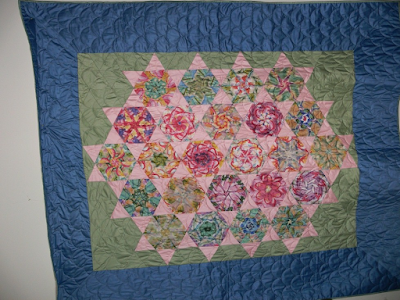Stack and Whack
This is a technique first introduced by Bethany Reynolds probably 25 years ago more or less. It is a short-cut method of creating kaleidoscopic blocks by cutting and stacking fabrics after you have determined what the repeat is by looking along the selvedge of the fabric. The key to a successful quilt block is choosing fabrics that match the variation of the technique that you are using and whether you want to make a bold statement or something more subtle and calming. Overall, the best fabrics have a repeat that is between 12 and 36 inches with a design that quite varied but with significant areas of color. The smaller the print, the smaller you will want to cut your squares or triangles to get the best effect. I generally cut my strips between 2 1/2 inches to 4 1/2 inches. I let the length of the repeat and the size of the elements be my guide. For instance, with a 12 inch repeat I would probably cut strips 2 3/4 for a smaller print (4 strips which would use 11 inches of the repeat). I do this as I want to make sure I get full strips and sometimes my ripped edges are a litle uneven. For a 24 inch repeat, I might make the strips 4 1/2 inches uilizing 22 1/2 in of the repeat. I would use a larger width strips when constructing hexagons or octagons as you lose width with he points. I very rarely use large strips for the 4 patch variation.
One of my very early stack and whack quilts. Tdhis uses 60 degree diamonds.
Another very early quilt and also 60 degree triangles.
I think this was my very first stack and whack using the technique from Bethany's book and using half square triangles.
One Block Wonder
This is a sub-category of the above where you only use the original fabric wihout adding any corners or sashing. The most popular form,of this is using hexagons (6 - 60 degree triangles). and arranging them in a pleasant design using the predominant colors in the block to guide you. I have seen 4 patch variations. A newer version of this quilt uses panel fabric (you need 7 repeats) where you reserve one repeat for the middle of the quilt. I think that the most successful ones of this type have used a fabric that has significant areas of different colors and maybe a large print with quite a bit of background or large areas of color variations.
.
This would be a good fabric for just about any variation but I chose to do a One Block Wonder,This was one iteration of trying out a setting.
This is an example of a one block wonder using a panel. I got this fabric on the sale rack at Walmarts and it was only $1.99/yd. I have found some of the best fabrics for these kaleidoscopic quilts are found in the sale racks I am especially drawn to flower prints myself.
Posie Block
This is also a more recent version of the stack and whack and uses 4 squares to complete the blocks. It is he simplest to construct and the most versatile as you can arrange the squares in four different configurations finding the one that is most pleasing to your eye.
A fairly recent posie quilt. These were the leftovers from a larger quilt. I also make potholders with blocks that don't make it into a quilt.
The picture below is the original quilt. You might notice this is a little different. I didn't have enough for 6 repeats so I did 3 repeats and combined them in blocks. Looks a lot different than this one!
This shows the versatility of the 4 patch posie. The "sister" blocks are sitting next to each other and look quite different!
I wish I had more pictures of the beginning fabric to show with these examples.
Here is a piece of fabric for the above posie blocks.






















No comments:
Post a Comment